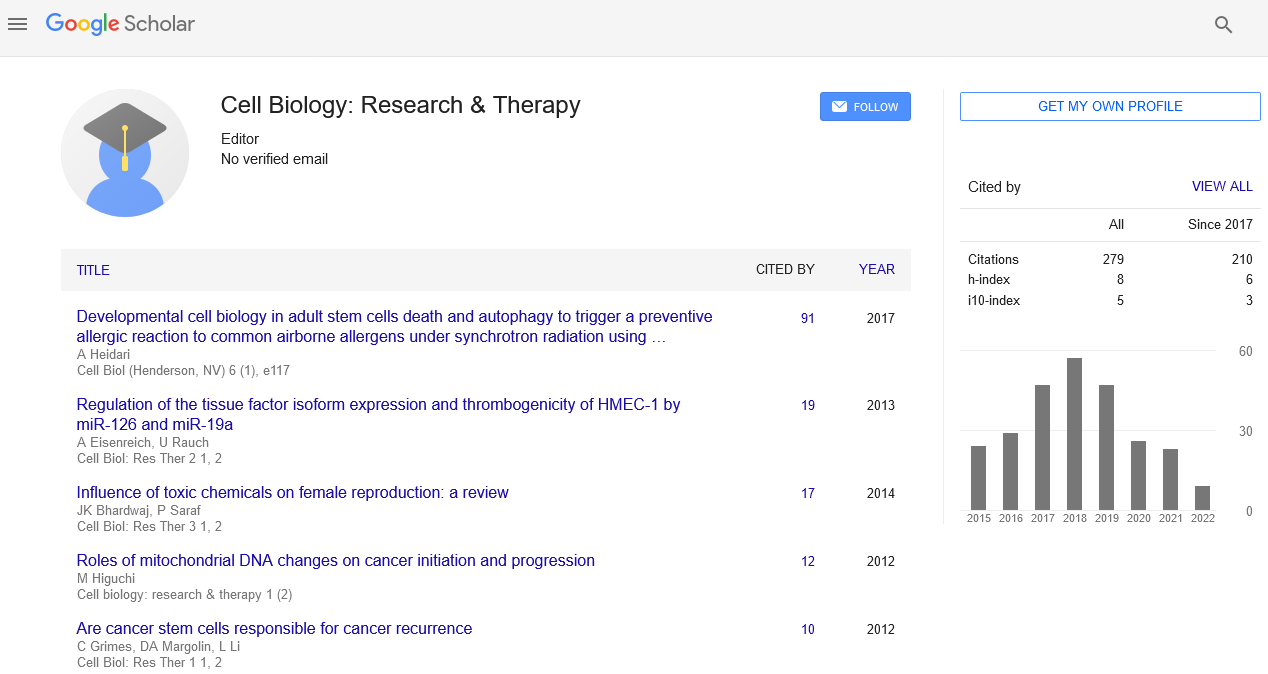Opinion Article, Cell Bio Vol: 12 Issue: 1
The Role of Oncogenes and Tumor Suppressors in Cell Cycle Control
Qin Chiang*
1Department of Life Sciences, Shenyang Normal University, Shenyang, China
*Corresponding Author: Qin Chiang
Department of Life Sciences,
Shenyang Normal University, Shenyang, China;
E-mail: chiangq@shenyang.edu.cn
Received date: 21 February, 2023, Manuscript No. CBRT-23-95183;
Editor assigned date: 23 February, 2023, Pre QC No. CBRT-23-95183(PQ);
Reviewed date: 07 March, 2023, QC No. CBRT-23-95183;
Revised date: 14 March, 2023, Manuscript No. CBRT-23-95183(R);
Published date: 24 March, 2023, DOI: 10.4172/2324-9293.1000171
Citation: Chiang Q (2023) The Role of Oncogenes and Tumor Suppressors in Cell Cycle Control. Cell Biol 2023 12:1.
Description
Oncogenes and tumor suppressors play important roles in the regulation of the cell cycle. The cell cycle is a tightly regulated process that controls cell growth and division. It is divided into two main phases: interphase, where the cell grows and replicates its DNA, and mitosis, where the cell divides into two daughter cells.
Impact of mutations in oncogenes and tumor suppressors on cancer development
Oncogenes: Oncogenes are genes that have the potential to cause cancer when mutated. These genes code for proteins that regulate cell growth and division. When an oncogene is mutated, the protein it codes for may become overactive, leading to uncontrolled cell growth and division.
One of the most well-known oncogenes is the RAS gene . The RAS protein is involved in signaling pathways that regulate cell growth and division. When the RAS gene is mutated, and the RAS protein becomes overactive, leading to uncontrolled cell growth and division.
Another oncogene is the Myc gene. The Myc protein is a transcription factor that regulates the expression of genes involved in cell growth and division. When the Myc gene is mutated, the Myc protein becomes overactive, leading to uncontrolled cell growth and division.
Tumor suppressors: Tumor suppressors are genes that help prevent cancer. These genes code for proteins that regulate cell growth and division, and they help to prevent the accumulation of mutations that can lead to cancer. When a tumor suppressor gene is mutated, the protein it codes for may become inactive, leading to uncontrolled cell growth and division.
One of the most well-known tumor suppressor genes is the p53 gene. The p53 protein is involved in regulating the cell cycle and preventing the accumulation of mutations that can lead to cancer. When the p53 gene is mutated, the p53 protein becomes inactive, leading to uncontrolled cell growth and division.
Another tumor suppressor gene is the RB1 gene. The RB1 protein is involved in regulating the cell cycle and preventing the accumulation of mutations that can lead to cancer. When the RB1 gene is mutated, the RB1 protein becomes inactive, leading to uncontrolled cell growth and division.
The cell cycle
The cell cycle is divided into several phases, including the G1 phase, the S phase, the G2 phase, and the M phase. During the G1 phase, the cell grows and prepares for DNA replication. During the S phase, the cell replicates its DNA. During the G2 phase, the cell prepares for cell division. During the M phase, the cell divides into two daughter cells.
The cell cycle is regulated by a series of checkpoints that ensure that each phase of the cycle is completed correctly before the cell moves on to the next phase. The checkpoints are regulated by several proteins, including cyclins and Cyclin-Dependent Kinases (CDKs).
Cyclins and CDKs
Cyclins are proteins that regulate the activity of CDKs. CDKs are enzymes that regulate the progression of the cell cycle. The activity of CDKs is regulated by the binding of cyclins. Different cyclins are produced at different stages of the cell cycle, and they bind to specific CDKs to regulate the progression of the cycle.
Mutations in oncogenes and tumor suppressors can disrupt the regulation of the cell cycle by affecting the activity of cyclins and CDKs. For example, mutations in oncogenes can lead to the overproduction of cyclins, leading to uncontrolled cell growth and division. Mutations in tumor suppressor genes can lead to the inactivation of CDK inhibitors, leading to uncontrolled cell growth and division.
 Spanish
Spanish  Chinese
Chinese  Russian
Russian  German
German  French
French  Japanese
Japanese  Portuguese
Portuguese  Hindi
Hindi 